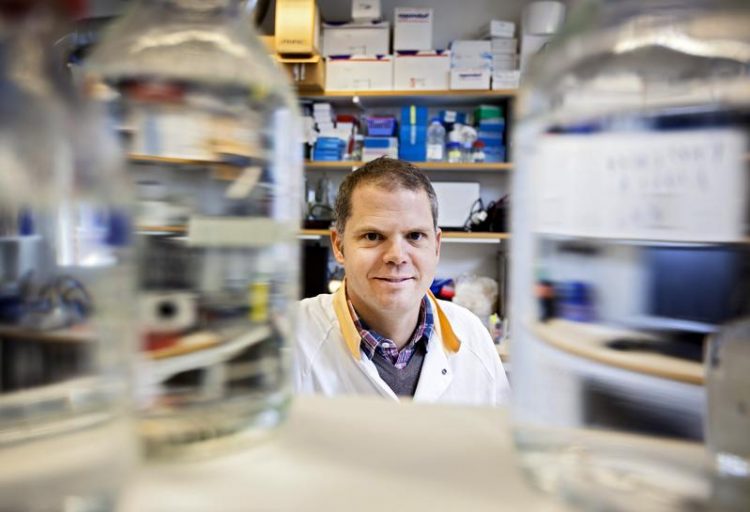The gut microbiota plays a key role in treatment with classic diabetes medication

Fredrik Bäckhed Photo: Johan Wingborg
“It is fascinating that it is not entirely clear how metformin works, although it has been used clinically for 60 years”, says Fredrik Bäckhed, Professor of Molecular Medicine, and the leading researcher behind the study published in Nature Medicine.
The human body contains more bacteria than human cells. Most of these bacteria exist in the gut, which is the most densely populated ecosystem known today, where their genes (microbiome) complements our own genome with 1000-fold more genes.
Improved blood glucose control
Fredrik Bäckhed’s research group at Sahlgrenska Academy has previously shown that the gut microbiota is altered in patients with type 2 diabetes and after bariatric surgery. By conducting a clinical study in patients with new onset diabetes, the group could clarify how the gut microbiomeis affected by metformin.
Sequencing of the microbiome of 22 patients before and after treatment compared with a placebo treated group of patients showed that the gut microbiome was altered dramatically within two months of treatment. Through experiments in the laboratory, the researchers demonstrated that metformin increases the growth of several bacterial species that are linked to improved metabolism.
“Transplantation of the gut microbiota from patients before and after treatment to bacteria-free mice showed that the metformin-modified microbiota may at least partially explain the good effects of metformin on blood glucose control”, says Fredrik Bäckhed.
More help to come
Some patients with type 2 diabetes can control their disease with metformin, while others are not helped. Perhaps this is due to their microbiome configuration. Moreover, the most common adverse events are intestinal problems such as diarrhoea and abdominal pain.
“Imagine if we can change the intestinal flora in the future so that more people respond to treatment, and that adverse events can be reduced by changing the gut microbiota of patients who will take metformin”, concludes Fredrik Bäckhed.
Link to the article: http://www.nature.com/nm/journal/vaop/ncurrent/full/nm.4345.html
Portrait photo: Johan Wingborg
Press contact: Anna von Porat +46 (0)766 186 146; anna.von.porat@gu.se
http://sahlgrenska.gu.se/english/research/news-events/news-article//the-gut-micr…
Media Contact
All latest news from the category: Health and Medicine
This subject area encompasses research and studies in the field of human medicine.
Among the wide-ranging list of topics covered here are anesthesiology, anatomy, surgery, human genetics, hygiene and environmental medicine, internal medicine, neurology, pharmacology, physiology, urology and dental medicine.
Newest articles

Economies take off with new airports
A global study by an SUTD researcher in collaboration with scientists from Japan explores the economic benefits of airport investment in emerging economies using nighttime satellite imagery. Be it for…

CAR T–cell immunotherapy targets
Pan-cancer analysis uncovers a new class of promising CAR T–cell immunotherapy targets. Scientists at St. Jude Children’s Research Hospital found 156 potential CAR targets across the brain and solid tumors,…

Stony coral tissue loss disease
… is shifting the ecological balance of Caribbean reefs. The outbreak of a deadly disease called stony coral tissue loss disease is destroying susceptible species of coral in the Caribbean…





















